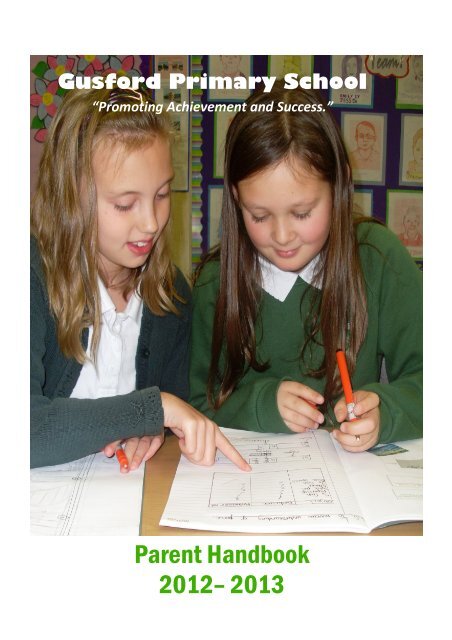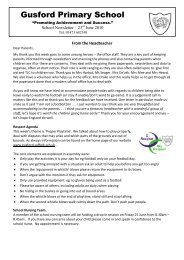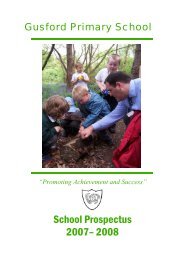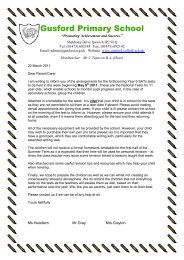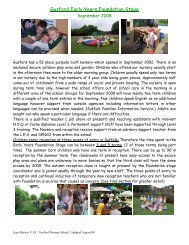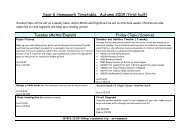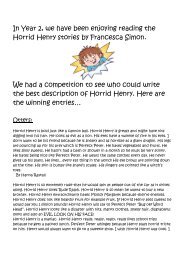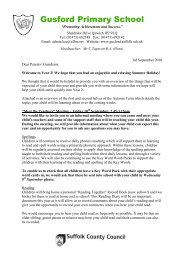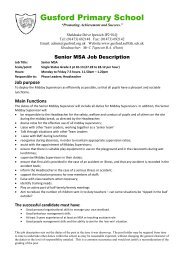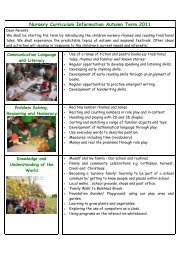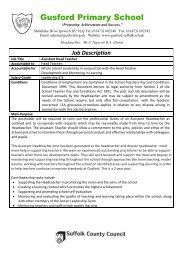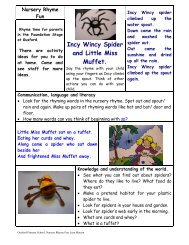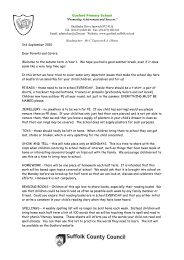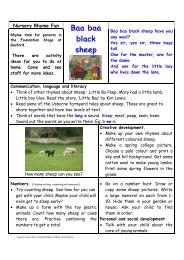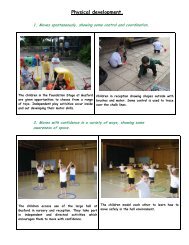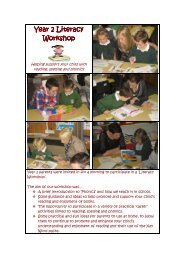Parent Prospectus - Gusford Primary School
Parent Prospectus - Gusford Primary School
Parent Prospectus - Gusford Primary School
You also want an ePaper? Increase the reach of your titles
YUMPU automatically turns print PDFs into web optimized ePapers that Google loves.
\\Srv1430\shared$\Admin\_2008 admin mapping\2 Stakeholders\<strong>School</strong> Office Information\<strong>Parent</strong>s\<strong>School</strong><br />
<strong>Prospectus</strong>\Academic Year 2012.2013.doc<br />
<strong>Gusford</strong> <strong>Primary</strong> <strong>School</strong><br />
“Promoting Achievement and Success.”<br />
<strong>Parent</strong> Handbook<br />
Page 0 of 25<br />
2012– 2013
\\Srv1430\shared$\Admin\_2008 admin mapping\2 Stakeholders\<strong>School</strong> Office Information\<strong>Parent</strong>s\<strong>School</strong><br />
<strong>Prospectus</strong>\Academic Year 2012.2013.doc<br />
CONTENTS<br />
Contents ...................................................................................... Page 1<br />
Headteacher’s welcome ............................................................. Page 2<br />
Aims of the <strong>School</strong> ...................................................................... Page 3<br />
<strong>School</strong>s Hours............................................................................... Page 4<br />
Organisation of Classes ............................................................... Page 5<br />
<strong>School</strong> Uniform ........................................................................... Page 6<br />
PE & Sports Clothing ................................................................... Page 7<br />
<strong>School</strong> Meals ............................................................................... Page 8<br />
Home <strong>School</strong> Links ...................................................................... Page 9<br />
Communicating with the <strong>School</strong> ............................................... Page 10<br />
Complaints Procedure .............................................................. Page 10<br />
Medical Arrangements ............................................................. Page 11<br />
Accidents & Illnesses in <strong>School</strong> ................................................. Page 12<br />
The <strong>School</strong> Curriculum ......................................................... Page 13-15<br />
Assemblies ................................................................................ Page 14<br />
Special Needs ............................................................................ Page 15<br />
Behaviour .................................................................................. Page 16<br />
<strong>School</strong> Values ............................................................................ Page 16<br />
Sex Education ............................................................................ Page 17<br />
Homework ................................................................................. Page 17<br />
Charging & Remissions Policy ................................................... Page 17<br />
Absence & Attendance ............................................................. Page 18<br />
National Curriculum Assessment Tests .................................... Page 19<br />
Target Setting ............................................................................ Page 19<br />
<strong>School</strong> Governing Body ............................................................. Page 20<br />
<strong>School</strong> Staff ............................................................................... Page 21<br />
Holiday Dates ............................................................................ Page 22<br />
<strong>Gusford</strong> <strong>Primary</strong> <strong>School</strong>, Sheldrake Drive Ipswich IP2 9LQ<br />
Telephone 01473 682148 Fax 01473 692142<br />
Email admin@gusford.org.uk Website: www.gusford.suffolk.sch.uk<br />
Headteacher Mr. Colin Tapscott<br />
Community <strong>Primary</strong> <strong>School</strong> - Mixed Ability 5 to 11 and Nursery<br />
Chair of Governors Mrs Linda Winstone<br />
Page 1 of 25
\\Srv1430\shared$\Admin\_2008 admin mapping\2 Stakeholders\<strong>School</strong> Office Information\<strong>Parent</strong>s\<strong>School</strong><br />
<strong>Prospectus</strong>\Academic Year 2012.2013.doc<br />
Welcome<br />
Welcome to <strong>Gusford</strong> <strong>Primary</strong> <strong>School</strong>. We hope that this will be the start of a long<br />
and happy association. We are all very proud of our school and hope that you will<br />
come to share that feeling with us. This handbook tries to set out a glimpse of life at<br />
<strong>Gusford</strong>. This includes the activities and opportunities available to all children<br />
together with practical information for parents.<br />
I joined <strong>Gusford</strong> in April 2007 and it became clear from early on that <strong>Gusford</strong> is a<br />
school with great potential. Staff, children and parents all work together to get the<br />
best for the children and for them to have a broad and balanced curriculum and to<br />
enjoy learning. <strong>Gusford</strong> had its fair share of success in Sport and academic results<br />
that are improving throughout the school. In the four years that I have been<br />
Headteacher here we have seen KS2 writing results rise by over 20% and maths results rise by 13%. This has been<br />
through focusing on each child and targeting their needs. Of course we still have improvements to make, like all<br />
schools, but one thing you can be sure of is that <strong>Gusford</strong> is a school where your child will not only have good<br />
memories of their learning but will develop an enthusiasm for their learning.<br />
Engaging Learning<br />
I have always believed that children should enjoy learning and that their<br />
time at primary school should be a time that creates lasting happy<br />
memories. Hopefully as you look through our handbook you will recognise<br />
that <strong>Gusford</strong> is a place that creates those memories for our children<br />
because we try to bring learning alive. We have science days, sports<br />
tournaments & trophies and woodland walks which give a flavour of things<br />
that happen at <strong>Gusford</strong>. Alongside this our aim is to help children achieve<br />
the best academic results. Please do look at our website,<br />
www.gusford.suffolk.sch.uk, especially your year group page, newsletters<br />
and parent page to get up to date information on things we are doing.<br />
A Partnership in Learning<br />
<strong>Gusford</strong> is a community primary school and our motto "Promoting Achievement & Success" means that alongside<br />
our learning we want to work with parents and members of the community to achieve for our children. Our aim is to<br />
get to<br />
know each other as well as possible so that your child can be educated in a happy and<br />
stimulating environment based on friendship, co-operation and understanding.<br />
Please remember that if you or your child have any concerns or worries at home<br />
or at school, however small, it would help us to know about them.<br />
By working closely together we can build and maintain a school environment<br />
where consideration for others and courtesy to all provide a firm foundation<br />
from which our children will be prepared to face life with confidence in the<br />
twenty first century.<br />
Colin Tapscott<br />
Page 2 of 25
\\Srv1430\shared$\Admin\_2008 admin mapping\2 Stakeholders\<strong>School</strong> Office Information\<strong>Parent</strong>s\<strong>School</strong><br />
<strong>Prospectus</strong>\Academic Year 2012.2013.doc<br />
Headteacher<br />
Page 3 of 25
\\Srv1430\shared$\Admin\_2008 admin mapping\2 Stakeholders\<strong>School</strong> Office Information\<strong>Parent</strong>s\<strong>School</strong><br />
<strong>Prospectus</strong>\Academic Year 2012.2013.doc<br />
Introducing <strong>Gusford</strong><br />
<strong>Gusford</strong> <strong>Primary</strong> <strong>School</strong> provides education for around 600 children aged from 4 to 11 years and is able to cater for<br />
an annual intake of up to 90 children. We are situated in the Chantry area of Ipswich. The school, which was opened<br />
in 1962, has 21 classrooms, 2 halls, a learner swimming pool, computer suite and a number of group rooms and<br />
resource areas. The school serves the Brookwood, Thorrington Park, Belstead Hills and Chantry area of South West<br />
Ipswich. Details of the precise catchment area may be obtained from the school office. There are pleasant grounds<br />
with much landscaping around the site. There is also a beautiful environmental area with a pond and natural<br />
hedgerow which are used by the children as part of their studies.<br />
Our Aims<br />
SAFE: Develop a safe community, where each child<br />
will learn to share and live together, showing care and<br />
respect for people and property.<br />
HEALTHY: Provide a curriculum which cover all<br />
areas of the Foundation Stage, Key Stage 1 and 2 that<br />
takes account of the children’s interests. We will plan<br />
the curriculum to include access for children of all<br />
abilities to extend them at their appropriate level and<br />
that promotes basic skills and a healthy lifestyle.<br />
ENJOY & ACHIEVE: Develop resources and up-date areas of the curriculum regularly in order to<br />
create a stimulating environment that provides the best quality teaching and learning experiences possible<br />
that will enable children to enjoy and achieve.<br />
ECONOMIC WELLBEING: Ensure that the children are secure and happily settled into school so<br />
that they may develop to their full potential, confidently taking responsibility for their own independent<br />
learning and prepare them for their future well being.<br />
POSITIVE CONTRIBUTION: Encourage the involvement of the wider community where<br />
governors, parents, children and staff, work together to make a positive contribution for the benefit of all.<br />
SAFEGUARDING: <strong>Gusford</strong> is committed to the safeguarding and welfare of children. It has<br />
thorough safeguarding policies and a safe recruitment policy. If you have any concerns regarding the<br />
welfare of a child at <strong>Gusford</strong> please contact our safeguarding leaders: Mr Tapscott, Headteacher, and Mrs<br />
Green, Deputy Headteacher. They can be contacted by phoning the school on 01473 682148.<br />
Page 4 of 25
\\Srv1430\shared$\Admin\_2008 admin mapping\2 Stakeholders\<strong>School</strong> Office Information\<strong>Parent</strong>s\<strong>School</strong><br />
<strong>Prospectus</strong>\Academic Year 2012.2013.doc<br />
Daily Timetable<br />
For all the children, the hours of the morning session are the same, but in the afternoon the Key Stage<br />
2 children work longer. The times are:<br />
MORNING<br />
AFTERNOON<br />
REC & KS1<br />
8.50 am - 12.00 noon<br />
BREAK 10.40-10.55am<br />
1.10 pm – 3.20 pm<br />
BREAK 2.20-2.30pm<br />
KS2<br />
8.50 am – 12.15 noon<br />
BREAK 10.40-10.55am<br />
1.10 pm – 3.30 pm<br />
Break 2.20-2.30pm<br />
There is a break of 15 minutes during each morning for everyone but only the Reception and Key<br />
Stage 1 have a 15 minute break in the afternoon. For each full school week the time is spent as<br />
follows:<br />
REC & KS1<br />
KS2<br />
Teaching Time (not 21 hours 15 minutes 23 hours 20 minutes<br />
including Assemblies)<br />
Assemblies 1 hour 15 minutes<br />
1 hour 15 minutes<br />
(15 mins collective worship)<br />
(15 mins collective worship)<br />
Registration 1 hour 15 minutes 1 hour 15 minutes<br />
Breaks 1 hour 15 minutes 1 hour 15 minutes<br />
Children should not arrive onto the school premises before 8.40am as there is no duty teacher to<br />
supervise them before that time, unless they are involved in an official school practice or club. Children<br />
who go home for the mid-day meal are not expected to return to school before 1.00pm.<br />
Teachers undertake supervision in the playground from approximately 8.40am. In the Reception and Key<br />
Stage 1 the children line up in class groups ready to be taken in by their class teachers. <strong>Parent</strong>s should say<br />
goodbye to their children outside so that they are ready to go into class at 8.50am promptly. The main<br />
entry doors remain open for 10 minutes. Children who arrive at school after 8.50am must report to the<br />
main school office.<br />
Page 5 of 25
\\Srv1430\shared$\Admin\_2008 admin mapping\2 Stakeholders\<strong>School</strong> Office Information\<strong>Parent</strong>s\<strong>School</strong><br />
<strong>Prospectus</strong>\Academic Year 2012.2013.doc<br />
Organisation of Classes<br />
Reception<br />
In September 2011 the government changed the system for entry into school. All children enter reception<br />
in September. At <strong>Gusford</strong> we believe that starting school is a big jump for many children and so we have a<br />
period of induction where children start part time and this is increased to full time over the first two weeks.<br />
We have 3 classes in reception which are mixed age and ability which should reduce the need to re-organise<br />
classes at the end of the year which we have traditionally had to do to when children entered at three<br />
points in the year.<br />
KS2<br />
Due to numbers in some year groups we have one mixed age Y3/4 class and Y5/6 class. Class sizes now<br />
range between 27 and 30. There are setting ability groups for children in Mathematics in years 3 to 6.<br />
Throughout the school we support children with ‘booster’ sessions to help them achieved the expected<br />
level. For those children who have greater difficulties the Special Needs Co-ordinator (SENCO) organises<br />
additional group work and provide individual support programmes which are delivered by teaching<br />
assistants.<br />
Nursery<br />
Following the changes to entry into school the school has reduced<br />
its nursery to 26 places in the morning. It opens from 9.00am -<br />
12.00pm<br />
<strong>Parent</strong>s are advised to fill in an application form soon after their<br />
child’s second birthday. Children are usually offered 2 terms in the<br />
nursery before starting school full time. However, places may be<br />
offered to younger children if the nursery is not full. The nursery<br />
admission criteria are available from the school office or from<br />
Suffolk County Council (<strong>School</strong>s in Suffolk booklet).<br />
Page 6 of 25
\\Srv1430\shared$\Admin\_2008 admin mapping\2 Stakeholders\<strong>School</strong> Office Information\<strong>Parent</strong>s\<strong>School</strong><br />
<strong>Prospectus</strong>\Academic Year 2012.2013.doc<br />
<strong>School</strong> Uniform<br />
There is a school uniform and all children who attend the school are expected to comply with this. This<br />
policy was decided upon after 94% of parents voted in favour of a school uniform.<br />
BOYS<br />
GIRLS<br />
WINTER<br />
Long or short grey or black trousers<br />
White Polo T shirt or shirt with<br />
Bottle green jumper, cardigan, sweatshirt<br />
or fleece<br />
Flat solid black shoes<br />
Grey or bottle green pinafore dress or<br />
skirt<br />
Black or grey trousers<br />
White blouse or Polo T shirt<br />
Bottle green jumper, cardigan, sweatshirt<br />
or fleece<br />
Flat solid black shoes<br />
SUMMER<br />
Continue with the winter uniform or:<br />
(1) White shirt or Polo T shirt<br />
(2) Short sleeve shirt with short grey<br />
trousers or black / grey plain shorts<br />
Continue with the winter uniform or:<br />
(1) Plain style dress in green or checks<br />
or stripes<br />
(2) A white blouse or Polo T shirt with<br />
winter skirt or trousers<br />
White sandals with a back strap<br />
AVAILABLE FROM THE OFFICE ON TUESDAY, WEDNESDAY AND THURSDAY:<br />
Fleece with embroidered badge from £12.00 Nursery T Shirt £4.50<br />
Green Sweatshirts with embroidered badge from £11.50 Long Sleeved<br />
Polo Shirts with school badge from £7.50 Nursery T Shirt £7.50<br />
T Shirts with a school badge from £4.00<br />
<strong>School</strong> ties (recommended but optional) £2.00 Our uniform is good quality and we<br />
Caps with school badge £2.50 very rarely have issues with our<br />
Legionnaire caps with school badge £3.00 clothing. However if there are faulty<br />
Book bags with the school badge £3.50 items these will have to be returned<br />
Gym bags with the school badge £3.00 to the supplier for inspection before<br />
any refund or replacement can be<br />
given.<br />
Lost Property<br />
We cannot accept responsibility for loss or damage of children’s property, but if items are clearly named we<br />
will do our best to return them to their owner. Please mark your child’s name in all articles of clothing.<br />
<strong>Parent</strong>s are welcome to drop in to reclaim any lost items. Lost property is stored near the Small Hall.
\\Srv1430\shared$\Admin\_2008 admin mapping\2 Stakeholders\<strong>School</strong> Office Information\<strong>Parent</strong>s\<strong>School</strong><br />
<strong>Prospectus</strong>\Academic Year 2012.2013.doc<br />
PE Kit<br />
Children will need a variety of equipment, depending on the season:<br />
INDOOR PE<br />
OUTDOOR PE<br />
• Plain white or blue T Shirt with<br />
• Plain black or blue shorts<br />
• A leotard or black or blue wrapover skirt may be worn by the girls if<br />
preferred<br />
• Leotards are not recommended for outdoor wear in winter<br />
• Key Stage 2 children require plimsolls or trainers which should be kept<br />
throughout the week with their PE kit in school<br />
• In winter children need a tracksuit or to change into warm clothing<br />
including a thick jumper<br />
• Children in Years 4, 5 and 6 are allowed to bring football boots during our<br />
football season if they wish<br />
• A change of socks is recommended for those children who have PE lessons<br />
on the field in winter<br />
• In the Summer Term Reception and Key Stage 1 children also need<br />
plimsolls or trainers for outdoor PE<br />
• In the Summer Term all children need a swimming costume, towel and<br />
swimming hat<br />
Please ensure that ALL sports equipment is<br />
marked with your child’s name.<br />
Earrings must be removed for all PE lessons. It is<br />
the responsibility of each child to do this. If it is<br />
not possible to remove studs or sleepers, parents<br />
must provide sticking plaster to cover them so<br />
that there is no danger to themselves or others<br />
during PE. In swimming the only option is remove<br />
earrings. Please do not have your child’s ears<br />
pierced during the Summer Term as this will<br />
prevent your child from joining in with swimming<br />
lessons.
<strong>School</strong> Meals<br />
\\Srv1430\shared$\Admin\_2008 admin mapping\2 Stakeholders\<strong>School</strong> Office Information\<strong>Parent</strong>s\<strong>School</strong><br />
<strong>Prospectus</strong>\Academic Year 2012.2013.doc<br />
<strong>School</strong> Meals<br />
The school kitchen, under the supervision of the Cook, provides a meal on a cafeteria basis. The current<br />
prices are:<br />
Meal £2.10 Carton of Milk £0.25 Fruit Juice £0.35 Milkshake £0.55<br />
A cashless cafeteria system is used. <strong>Parent</strong>s and older children pay money into a revaluation machine<br />
located in the front entrance. Each child has a PIN number which has to be entered into the machine.<br />
<strong>Parent</strong>s can pay a week, month or a term in advance. Cheques are put into a special collection box and are<br />
made payable to ‘Suffolk County Council’ with the child’s name and class written clearly on the back.<br />
Packed Lunch<br />
Provision is made for children to bring their own packed lunch, and water and glasses are provided.<br />
Children who bring their own food may purchase drinks from the cash cafeteria. Children are not permitted<br />
(for safety reasons) to bring tins, glass bottles or fizzy drinks. As the school has ‘Healthy <strong>School</strong>s’ status we<br />
encourage parents to provide a healthy packed lunch for their child and therefore avoid large quantities of<br />
chocolate biscuits etc. as this does affect some children’s behaviour in the afternoon. Bars of chocolate and<br />
sweets are not allowed for packed lunch.<br />
Nuts in Packed Lunches<br />
I am sure that many parents are aware that some children suffer extreme allergic reaction to nuts. This can<br />
result in death if airways are blocked as a result of swelling in the throat. Therefore, I request all parents<br />
not to put items containing nuts into their child’s packed lunches (eg Peanut butter sandwiches, bags of<br />
peanuts or mixed nuts)<br />
Free Meals<br />
In certain cases free meals are available to children. Application forms and further details may be obtained<br />
from the <strong>School</strong> office. Those eligible for Free <strong>School</strong> Meals are those in receipt of any one of the following<br />
benefits:<br />
• Income Support<br />
• Employment Support Allowance (income related)<br />
• Income based jobseekers allowance<br />
• Guarantee element of state pension credit<br />
• Supported under Part VI of the Immigration and Asylum Act 1999<br />
• Child Tax Credit only and your taxable income is below £16,190.<br />
(Working Tax Credit does not qualify you for free school meals.)<br />
Break Time Snacks<br />
As part of our approach to health education the school has adopted a healthy eating policy. Children are<br />
only allowed to bring in fresh fruit or a cereal bar to eat during morning break time. This must be stored<br />
separately from packed lunch, as children are not allowed to access their packed lunch box during break<br />
time.
\\Srv1430\shared$\Admin\_2008 admin mapping\2 Stakeholders\<strong>School</strong> Office Information\<strong>Parent</strong>s\<strong>School</strong><br />
<strong>Prospectus</strong>\Academic Year 2012.2013.doc<br />
Partnership with <strong>Parent</strong>s<br />
A Partnership in Learning<br />
Just one click on our ‘<strong>Parent</strong>s’ web page reveals a host of ways we help<br />
parents (www.gusford.suffolk.sch.uk/parents.html ) to support their<br />
children.<br />
Informing . . . At the start of each year we have a meeting in each year<br />
group/phase with parents to explain the setup for the year. This is followed<br />
up by curriculum information and homework for the term both in letters<br />
and the year group webpage. www.gusford.suffolk.sch.uk/yeargroup.html<br />
Collaborating . . . Throughout the year we have ‘Learning Together’<br />
workshops where parents come and work with their children and learn<br />
together. Subjects in the last year have included Design Technology,<br />
Maths, Sex Education, healthy eating and ICT web safety.<br />
Reporting . . . We believe that you as parents need to know how your<br />
child is progressing. We have a parent/teacher consultation in the<br />
Autumn and Spring terms and an end of year report & Open Evening in<br />
the Summer term. In these consultations we update you on what is<br />
expected, what they have achieved and what they need to work on next.<br />
Helping . . . We have lots of parent helpers and a fantastic PCA who give a<br />
lot of their time. <strong>Parent</strong>s are welcome in school and can become regular<br />
helpers after completing a criminal records check (CRB).<br />
Communicating . . . Children need to feel that their parents and<br />
teachers have mutual respect. We endeavour to promote this relationship<br />
and hope that parents have similar aims. The school has adopted a<br />
parent/school contract. This is given to all parents of children when they<br />
start the school and again when they transfer to Key Stage 2.<br />
Before your child starts school, and during the early part of each Autumn Term, we ask parents to complete<br />
a form giving the school certain information, in particular how to contact you in an emergency. Please<br />
make sure that this form is completed and returned and that the information is updated as and when<br />
necessary (eg if you move house, or change your home or work telephone number etc). This information is<br />
vital if your child is ill or in an emergency situation.
\\Srv1430\shared$\Admin\_2008 admin mapping\2 Stakeholders\<strong>School</strong> Office Information\<strong>Parent</strong>s\<strong>School</strong><br />
<strong>Prospectus</strong>\Academic Year 2012.2013.doc<br />
Contacting <strong>Gusford</strong><br />
Generally communication with the teachers should be by letter as teaching commitments and the size of the<br />
site make it difficult for them to come to the office telephone. Emergency messages will of course be passed<br />
onto children or their teachers.<br />
The <strong>School</strong> Telephone number is 01473 682148<br />
If your child is absent you can leave a message on the answerphone to tell us why they are not in school.<br />
The answerphone is on from 4:15pm to 8:30am.<br />
The Fax Number is 01473 692142<br />
Our Email address is<br />
admin@gusford.org.uk<br />
Making Appointments<br />
It is usually best to speak to teachers briefly before or after school if you have any concerns or need to pass<br />
on information. If you need to discuss matters for a longer time or cannot see the teacher before or<br />
immediately after school, you need to contact the office staff to make an appointment. You should give<br />
them brief details of the problem so that the teacher can investigate specific incidents or have the right<br />
information to hand when you meet them.<br />
Complaints Procedure<br />
The Suffolk Education Authority procedure is as follows:<br />
The LEA has established procedures so that the concerns of parents and others, about the school<br />
curriculum and related matters may be considered and - whenever possible - resolved locally. The<br />
arrangements are to apply to complaints relating to the curricular responsibilities of the LEA or the<br />
governing body of a county, voluntary or maintained special school: that the authority or governing body<br />
has acted, or is proposing to act, unreasonably or has failed to comply with the requirements or duties<br />
imposed by the Education Reform Act 1988.<br />
1. In the first instance, particular problems should be referred to the class teacher.<br />
2. If not resolved problems should be referred to a senior member of staff.<br />
3. If still unresolved problems should be referred to the Headteacher who will endeavour to achieve a<br />
satisfactory outcome by informal means, if necessary through discussion with appropriate members<br />
of staff and the complainant.<br />
4. If, however, the issue cannot be resolved in this way, it may be referred first to a panel of governors<br />
of the school.<br />
5. As a last resort, to an LEA panel for formal consideration. Further details of the authority’s<br />
procedures may be obtained from the Headteacher or the Area Education Officer.
\\Srv1430\shared$\Admin\_2008 admin mapping\2 Stakeholders\<strong>School</strong> Office Information\<strong>Parent</strong>s\<strong>School</strong><br />
<strong>Prospectus</strong>\Academic Year 2012.2013.doc<br />
Medical Issues<br />
<strong>School</strong> Absence<br />
If your child is absent from school, you need to send a note to the class teacher explaining the reason for<br />
absence. Please telephone the school before 9:30am to tell us why they are absent. The answerphone is<br />
on from 4:15pm to 8:30am if you wish to leave a message. In the interests of all, children who have been<br />
sick should not return to school for at least 48 hours after the last bout of sickness.<br />
Medical Checks<br />
The school nursing team will see your child with written consent during the second term, this will include<br />
hearing and vision concerns. If you wish to see the school doctor, appointments can be arranged through<br />
the school nurse who may refer your child following discussion. Lacey Swann, the current school nurse can<br />
be contacted at Chantry Clinic (telephone no. 685964).<br />
Head lice<br />
Head lice are sometimes a problem. Advice can be obtained from the <strong>School</strong> Nurse, GP or Pharmacist.<br />
Please notify the school. A leaflet is available. The best method of prevention is to brush and comb your<br />
child’s hair prior to bed time and regularly check his/her hair at least once a week.<br />
Medical Appointments.<br />
It is expected that all children will be collected from school by their parents if they have to leave school<br />
during the day for a medical appointment or other reason.<br />
Administering medicine to children in <strong>School</strong>.<br />
On the issue of administering medicines to children, we follow the County guide-lines which are quoted<br />
below:<br />
“When children are ill, it is parents’ responsibility to ensure that they receive proper care and schools may<br />
advise parents that when their children are unwell they should not be sent to school. The administering of<br />
medicines to children is also parents’ responsibility, unless the circumstances (such as for pupils in a special<br />
school) make this impractical. Since very few medications need to be administered in the middle of the day<br />
when the child is well enough to be at school, parents may be expected either to keep the child at home or<br />
to arrange to administer the medicine personally if they believe a course of treatment to be necessary. The<br />
administering of medicines need not include the period 9.00am to 4.00pm”.<br />
In any of the special cases mentioned above, parents must consult the Headteacher (Office Manager when<br />
the Headteacher is not available) and provide written instructions on the administration of the particular<br />
drug. Before passing drugs or medicines of any type, the containers must be clearly labelled with (a) the<br />
child’s name and (b) the dosage to be ad-ministered.<br />
In other special cases we will co-operate wherever possible. However, parents should note that unless<br />
express permission has been granted by the Headteacher, children must not be in possession, in school, of<br />
medicines or drugs nor may the drugs be taken to classrooms or left in cloakrooms.
\\Srv1430\shared$\Admin\_2008 admin mapping\2 Stakeholders\<strong>School</strong> Office Information\<strong>Parent</strong>s\<strong>School</strong><br />
<strong>Prospectus</strong>\Academic Year 2012.2013.doc<br />
Accidents & Illnesses in <strong>School</strong><br />
In all cases of emergency the <strong>School</strong> Office will endeavour to get in touch with the parents concerned, but if<br />
this is not possible they will take appropriate action which may involve transporting a child to hospital,<br />
calling an ambulance or consulting a local doctor.<br />
When children are ill it is in their interests to be taken home to rest in comfortable and warm surroundings.<br />
The <strong>School</strong> Office will try to contact parents or, failing this, any other persons identified on the emergency<br />
form so that the child can be looked after by someone they know well.<br />
Asthmatics<br />
We have a number of children who regularly use an inhaler to combat asthma. These are stored in the<br />
school office and are available to children as and when they need them. The advantage of this system, is that<br />
• other children are unlikely to have access to them or tamper with them;<br />
• the office staff can monitor excessive usage and report to parents;<br />
• the children know where their inhalers are stored at all times;<br />
• reminders can be given to the children when further capsules are needed and that welfare staff are<br />
available to sort out any problems when children need to use their inhalers.<br />
We believe that this is the best system for the majority of asthma sufferers. Children who suffer serious,<br />
sudden asthma attacks may need to keep their inhaler with them at all times. If you wish your child to do<br />
this you must inform the Headteacher in writing. Children who keep their inhalers with them are entirely<br />
responsible for usage, storage and ensuring that other children are not allowed access to the inhaler.<br />
The school office will still need an inhaler in case the child mislays their own one.<br />
Healthcare Plans<br />
The school now draws up detailed plans for children who have significant health concerns. Please let the<br />
school know if your child has a health concern.<br />
Equal Opportunities<br />
At <strong>Gusford</strong> we aim to provide appropriate facilities for disabled children or adults. We have children<br />
enrolled with visual and aural difficulties as well as mobility problems. Within the constraints of the<br />
available resources we have improved areas of the school to provide equal access to the curriculum and<br />
school resources. There are three disabled toilets, handrails, non-slip floors and slopes and ramped access is<br />
provided to all main entrances.<br />
A disabled toilet has been provided in the new Nursery and access to the Nursery has been made for<br />
disabled pupils or adults.<br />
Applications to the school from pupils on medical grounds are given a high priority in our admission policy.<br />
However, decisions about admitting disabled pupils will be made taking into account the needs of the child<br />
and the ability of the school to provide adequately for these needs.
\\Srv1430\shared$\Admin\_2008 admin mapping\2 Stakeholders\<strong>School</strong> Office Information\<strong>Parent</strong>s\<strong>School</strong><br />
<strong>Prospectus</strong>\Academic Year 2012.2013.doc<br />
<strong>School</strong> Curriculum<br />
All pupils are expected to follow a balanced programme of study in the following National Curriculum<br />
subjects: English, Mathematics, Science, Technology, Information and Communication Technology (ICT),<br />
Geography, History, Music, Art and Physical Education plus, in addition Religious Education. Pupils are<br />
regularly assessed by their teachers, but at the end of Key Stage 1 (year 2) and Key Stage 2 (year 6) they are<br />
formally assessed in English Mathematics and Science.<br />
English<br />
The <strong>School</strong> uses the National Literacy Strategy as the basis for its curriculum plan. We also ensure that the<br />
children are grounded in the important skills for their age and often use a ‘Back to Basics’ approach when<br />
needed to reinforce the basic skills. Children spend at least one hour each day developing their reading and<br />
writing skills. Group reading takes place once a week and throughout the school phonics is taught to ensure<br />
the children understand letter sounds and blends in their reading<br />
and spelling. The school uses Oxford Reading Tree as its core<br />
reading scheme and supplements this with other schemes<br />
alongside a graded colour band system which provides extension<br />
and reinforcement reading materials.<br />
Mathematics<br />
In mathematics teachers follow the National Numeracy Strategy<br />
guidelines. In Y3 upwards we run a mental maths programme to<br />
focus on core skills expected for that age. From Y3 upwards we set for maths according to ability across the<br />
classes in a year group. This supports targeted intervention and support.<br />
ICT<br />
The school has good provision for computer work. There is a networked computer room with 30 modern<br />
computers. Each class has its own computer and there are also 3 mini networks of computers around the<br />
school. There is a laptop trolley with 16 laptops for classes to use. The school has just started using a<br />
programme called ICT alive to help teach the children ICT skills in a fun, interactive way.<br />
<strong>Parent</strong>s are asked to sign a form to give permission for their child to use the internet. The school has<br />
filtering software to block access to unadvisable websites.<br />
Science<br />
Children have around two hours Science teaching each week and this is delivered either through a Topic<br />
approach or through Stand alone units. We have a strong emphasis on learning through experience which<br />
involves a good use of scientific investigations.
\\Srv1430\shared$\Admin\_2008 admin mapping\2 Stakeholders\<strong>School</strong> Office Information\<strong>Parent</strong>s\<strong>School</strong><br />
<strong>Prospectus</strong>\Academic Year 2012.2013.doc<br />
<strong>School</strong> Curriculum<br />
Music<br />
The school is well known for its high standards in Music. Class lessons focus on developing rhythm, singing,<br />
instrumental work and music appreciation. Outside the school day many music activities are organised.<br />
Peripatetic teachers offer lessons on the violin, guitar and drums. Many of these children progress to<br />
instrumental examinations.<br />
Religious Education<br />
Pupils follow a programme of study taken from the Suffolk Agreed Syllabus. The major part of the work<br />
focuses on Christianity. Children will also cover units on Judaism, Islam and Hinduism.<br />
Assemblies<br />
Assemblies are non-denominational in character. The format of these will vary but will often include<br />
singing/worship, a story/teaching/reflection point and prayer. There are visits from leaders of the local faith<br />
communities to take assemblies. <strong>Parent</strong>s may withdraw their children from the arrangements for worship<br />
and religious education, if they wish. This should be discussed with the Headteacher before a decision is<br />
made.<br />
Sporting Aims And Provision For Sport<br />
Our aims are that children should:<br />
a) Experience the challenge and enjoyment that can be derived from team games and competition,<br />
b) Explore and start to develop the physical capabilities of their bodies through physical education<br />
activities<br />
PE is organised into six areas which children experience during each year. These are gymnastics, dance,<br />
athletics, individual and team games, swimming and outdoor/adventurous activities. The school has its<br />
own heated outdoor learner swimming pool. This is used by children from reception to Year 6 in the second<br />
half of the Summer Term. The Upper Key Stage 2 children also take part in deep water swimming at Crown<br />
Pools. Children are encouraged to gain swimming awards in both shallow and deep water.<br />
Each year there are Reception and Key Stage 1 and Key Stage 2 Sports afternoons and inter-class<br />
competitions for the older children.<br />
The range of extra curricular clubs is extensive and includes dance, football, netball, cricket, rugby touch<br />
and athletics. Teams are entered for local schools’ competitions in many of these areas and achieve a great<br />
deal of success.
\\Srv1430\shared$\Admin\_2008 admin mapping\2 Stakeholders\<strong>School</strong> Office Information\<strong>Parent</strong>s\<strong>School</strong><br />
<strong>Prospectus</strong>\Academic Year 2012.2013.doc<br />
<strong>School</strong> Curriculum<br />
<strong>School</strong> Clubs And Out Of <strong>School</strong> Activities<br />
These are provided as an extension to the school curriculum and give an opportunity for some gifted<br />
children to further develop their talents as well as for all children to join with teachers in a variety of<br />
activities in a more sociable and less formal way. The school uses external providers for this and <strong>Gusford</strong><br />
staff.<br />
Special Needs<br />
The Governors and staff believe it is important to try to incorporate children with different mental, physical<br />
and social or behavioural needs into the school. Some children are assessed by outside agencies before<br />
they start school. This is to assess whether the school can provide appropriate support for the child and if<br />
so what that support will need to be. Other children are identified after a period of assessment. This can be<br />
for several terms with younger children as they often do not reveal their true potential until after they have<br />
settled into school life and new routines.<br />
When problems are identified our Special Needs Co-ordinator (SENCO) carries out some initial screening<br />
tests and the child will be identified for <strong>School</strong> Action. At this stage some additional support will be<br />
provided in the class situation through small group work supported by a teaching assistant. If progress is<br />
not made or the difficulties are more deep seated, then the support will move to <strong>School</strong> Action Plus. At this<br />
stage additional support may be given by the SENCO and further advice may be sought from County<br />
Educational Advisory staff.<br />
From the advice a plan will be drawn up called an Individual Education Plan (IEP). The child’s progress will<br />
be monitored further. <strong>Parent</strong>s are closely involved throughout the process and their views are sought and<br />
taken into account.<br />
Resources which are needed to support Special Needs children are allocated via funding provided by Suffolk<br />
Education Department through auditing each school’s needs. With some children these may be serious,<br />
complex and long term, if so, a further assessment will be made and a Special Needs Statement drawn up<br />
by the Local Education Authority.<br />
The school has a detailed policy regarding the provision for gifted children. Groups of gifted mathematicians<br />
and writers are taken for Special Workshop sessions by subject leaders.
\\Srv1430\shared$\Admin\_2008 admin mapping\2 Stakeholders\<strong>School</strong> Office Information\<strong>Parent</strong>s\<strong>School</strong><br />
<strong>Prospectus</strong>\Academic Year 2012.2013.doc<br />
Behaviour<br />
The school’s behaviour policy is an important and central plank which underpins the work of the school.<br />
The last Ofsted report said<br />
Pupils have good attitudes to learning and they enjoy coming to school. Their behaviour is good.<br />
There is good provision for their personal development, including their spiritual, moral, social and<br />
cultural development.<br />
The staff of the school operate an assertive discipline policy with an emphasis on rewards and if necessary<br />
sanctions. In the event of poor behaviour warnings are given and if more than one warning is given in a day<br />
there are consequences such as time out and discussions with senior staff.<br />
As a member of the IP2 Partnership, <strong>Gusford</strong> has adopted the Chantry Pyramid of <strong>School</strong>s Statement<br />
concerning the rights of all pupils and staff when at school. These rights have been agreed as:<br />
• to feel safe and comfortable<br />
• to be treated with respect<br />
• to learn and teach without interruption<br />
• to communicate and to be listened to<br />
• to use, share and care for school facilities<br />
• to be valued for their achievement<br />
These rights carry with them responsibilities which are reinforced by school values and rules. All staff will<br />
endeavour to apply these rules consistently. Poor behaviour will be dealt with calmly, fairly and<br />
consistently and will have the consequence of agreed sanctions. Our aim is to encourage appropriate<br />
behaviour at all times.<br />
<strong>School</strong> Values & Rules<br />
The children and staff have established 6 school values which influence and underpin the way we deal with<br />
each other and conduct ourselves in school. The values have been deliberately written in a ‘snappy’ style so<br />
they are easily remembered by the children.<br />
1. To have friends: be friendly<br />
2. Have a go and do your best.<br />
3. Together Everyone Achieves More (T.E.A.M.)<br />
4. Help our school be green and tidy<br />
5. Take care of property<br />
6. Do things right, be polite<br />
As part of the school assertive discipline policy, each class has devised its own classroom code of behaviour<br />
stating the rules, rewards and consequences.
\\Srv1430\shared$\Admin\_2008 admin mapping\2 Stakeholders\<strong>School</strong> Office Information\<strong>Parent</strong>s\<strong>School</strong><br />
<strong>Prospectus</strong>\Academic Year 2012.2013.doc<br />
Policies<br />
Sex Education<br />
Sex Education is taught by class teachers throughout the school as part of the Science and Health<br />
curriculum. The majority of Sex Education within the school will not be explicit in its nature and will be<br />
more concerned with developing the children’s ‘social’ skills and attitudes. It will be only in Year 5 & 6 that<br />
detailed work will be carried out on body changes, human reproduction including conception, development<br />
of the foetus and birth. The section of work on Puberty in Year 5 will include looking at physical changes<br />
which take place at puberty and the emotional changes. One lesson on menstruation in Year 5 is taught in a<br />
single sex class as this enables the girls to talk more readily to the school nurse or member of staff. A copy<br />
of the Sex Education Policy is available from the Headteacher if required.<br />
Homework<br />
Homework is set on a termly/half termly basis and starts in Year 1 with about 20-30 minutes per week,<br />
rising to around 2 hours a week in Year 6. In addition to the set homework the children are expected to<br />
read regularly, learn spelling patterns, number bonds and tables. Research projects are given out from time<br />
to time. At the simplest level these may consist of children finding out information from relatives or<br />
friends. At the most complex level these may be mini projects, a biography or autobiography and may<br />
require research at home, from the library, from computer CDs or even the Internet. Completion of<br />
homework is dependant on the support of parents. Children are expected to complete homework. Some<br />
year groups offer a reward system for those children who complete the required amount of homework. We<br />
understand that many children lead very full active lives outside school and therefore we try to give more<br />
than one day to do the homework in case any outside school clubs clash with when homework is given.<br />
Homework timetables are on the website on year group pages: www.gusford.suffolk.sch.uk/yeargroup.html<br />
Charging & Remissions Policy<br />
A termly charge is made for instrumental lessons provided by the peripatetic teachers. This is £40 for the<br />
first child in a family, £35 for a second child. <strong>Parent</strong>s in receipt of free school meals are not charged and<br />
those who hold a Tax Credit Exemption Certificate – the charge for Sept 2011 to July 2012 will be £20.<br />
Please be aware that these music lessons are heavily subsidised by the school and once you have agreed<br />
that your child can do music lessons you have to give half a term’s notice if you wish your child to stop and<br />
all fees must be paid up until that date.<br />
<strong>Parent</strong>s are requested to make a voluntary contribution towards school visits and sometimes special<br />
performances given by theatre groups visiting the school. A copy of the full charging and remissions policy<br />
is available from the Headteacher.
\\Srv1430\shared$\Admin\_2008 admin mapping\2 Stakeholders\<strong>School</strong> Office Information\<strong>Parent</strong>s\<strong>School</strong><br />
<strong>Prospectus</strong>\Academic Year 2012.2013.doc<br />
Attendance<br />
Information on Absence and Pupil Attendance<br />
<strong>School</strong>s are required to keep and publish information about unauthorised absence. An unauthorised<br />
absence is one for which the school does not receive written notification of the reason why a child has been<br />
absent, or where the reason given is not regarded as satisfactory.<br />
Obviously it is difficult to set down a comprehensive list of acceptable reasons for absence.<br />
However, ‘going to buy new clothes’, ‘getting a hair cut’ or ‘having a day off as a birthday present’ are some<br />
of the reasons given which would not be authorised.<br />
The DfEE also suggests that ‘parents should be encouraged to avoid, as far as possible, arranging medical<br />
and similar appointments for their children during school hours. Normally children are collected from the<br />
school by an adult if they have such appointments.<br />
Education regulations have now changed with regards to taking holidays in term time. No holiday in term<br />
time will be routinely authorised. If you have an exceptional reason for your term time request for absence<br />
(e.g. no choice of holiday dates from your workplace, bereavement issues) then please write to the head<br />
teacher explaining the reason for your request. <strong>School</strong>s in the Chantry area have agreed that all such<br />
applications will be reviewed by the Educational Welfare Officer and she will decide whether it is to be<br />
authorised. This ensures consistency in holidays being granted. <strong>Parent</strong>s should consider that taking holidays<br />
during term time can be disruptive to their child’s education.<br />
If you take your child on holiday in term time and it is not authorised you will receive a warning letter from<br />
the Local Education Authority explaining that if further unauthorised absences occur you will be issued with<br />
a fixed penalty notice.<br />
If you are intending to take a family holiday please collect a permission form from the <strong>School</strong> Office. Work<br />
is not set by teachers when children are absent on holiday. Taking time off during the term is likely to<br />
adversely affect your child’s work, particularly in mathematics and English. Absence during the National<br />
Curriculum test week for Year 6 should be avoided at all costs. These are usually held during the second or<br />
third weeks of May each year.<br />
Attendance Levels 2010/2011<br />
<strong>Gusford</strong> attendance rate 93.7%<br />
National attendance rate 95.22%<br />
<strong>Gusford</strong> Daily Level of Authorised Absence 5.6%<br />
<strong>Gusford</strong> Daily Level of Unauthorised Absence 0.7%<br />
<strong>Gusford</strong> total absence 6.3%<br />
National total absence 5.78%
\\Srv1430\shared$\Admin\_2008 admin mapping\2 Stakeholders\<strong>School</strong> Office Information\<strong>Parent</strong>s\<strong>School</strong><br />
<strong>Prospectus</strong>\Academic Year 2012.2013.doc<br />
Results & Target Setting<br />
National Curriculum Assessment Tests<br />
<strong>School</strong>s are required by the Government to publish information about their pupils’ performance at the end<br />
of Key Stage 1 (Aged 6/7) and at the end of Key Stage 2 (Aged 10/11).<br />
The information given relates to assessments carried out by the teacher and tests carried out at the end of<br />
the year. Children are awarded levels of achievement. Typically a child at the end of Key Stage 1 who has<br />
achieved level 2 will have successfully completed work which has been designed to stretch the average 6/7<br />
year old. At the end of Key Stage 2 a child who has reached level 4 will have successfully completed work<br />
which has been designed to stretch the average 10/11 year old.<br />
Year 6 SATS results 2011 Year 2 SATS results 2011<br />
<strong>Gusford</strong><br />
L4+<br />
National<br />
L4+<br />
<strong>Gusford</strong><br />
L5+<br />
National<br />
L5+<br />
<strong>Gusford</strong><br />
2C+<br />
National<br />
2C+<br />
<strong>Gusford</strong><br />
2B+<br />
National<br />
2B+<br />
<strong>Gusford</strong><br />
3+<br />
National<br />
3+<br />
Reading 80% 84% 24% 51% Reading 80% 86% 65% 75% 12% 30%<br />
Writing 72% 75% 14% 21% Writing 86% 82% 52% 64% 5% 17%<br />
English 76% 18% 33% Maths 92% 90% 65% 76% 16% 24%<br />
Maths 76% 80% 23% 35%<br />
Eng&Ma 66% 74%<br />
Target Setting<br />
In each year group we set targets for improvement in Reading, Writing and Maths. Each child has a target<br />
for the end of the year too. We are required to set targets for achievement for the end of Year 6 which are<br />
set at the start of Year 5. Here are the 2012 targets:<br />
KS2 Statutory targets: Target for 2011 Actual for 2011 Target for 2012<br />
% level 4+ in both<br />
English and maths<br />
% 2 NC levels progress<br />
in English (KS1 – 2)<br />
% 2 NC levels progress<br />
in maths (KS1 – 2)<br />
63 66 64<br />
87 85 85<br />
78 76 86<br />
<strong>Parent</strong>s will notice that the same targets are not given for each group of children. This is because the mix of<br />
children in each year group is different and challenging targets will sometimes have to be lower for some<br />
year groups.
\\Srv1430\shared$\Admin\_2008 admin mapping\2 Stakeholders\<strong>School</strong> Office Information\<strong>Parent</strong>s\<strong>School</strong><br />
<strong>Prospectus</strong>\Academic Year 2012.2013.doc<br />
Governing Body<br />
The school is governed by a Governing Body which meets at least once or twice a term. This is made up of a<br />
number of representatives from Suffolk County Council, Ipswich Borough Council, elected parents,<br />
members of the school teaching staff and co-opted members.<br />
Their job is to oversee the efficient running of the school. A list of the present <strong>School</strong> Governors is given<br />
below.<br />
MEMBERS OF THE GOVERNING BODY<br />
Status Name Date Appointed<br />
Nominated by Suffolk County Council Mr R Fern<br />
Mrs L Winstone (Chair)<br />
01/09/2006<br />
01/2010<br />
Nominated by <strong>Parent</strong>s<br />
Mr O Arthur<br />
Mr R Marlow<br />
Mr R Fothergill<br />
Mr R King<br />
Mr S Fair<br />
Mr K Brooks<br />
31/10/2003<br />
20/04/2004<br />
20/07/2007<br />
20/07/2007<br />
26/05/2010<br />
18/07/2011<br />
Nominated by Teaching Staff<br />
Miss C Pearsons<br />
Mrs E Green<br />
15/03/2004<br />
04/11/2004<br />
Nominated by Non Teaching Staff Mrs S Kitcher 15/03/2011<br />
Community Members<br />
Rev Ali Chesworth<br />
Mr C Fiske<br />
Mrs B Wright<br />
Mrs P Dobson<br />
Miss D Phillips<br />
23/06/2011<br />
23/02/2005<br />
21/10/1992<br />
01/04/2009<br />
06/12/2011<br />
Ex Officio (Headteacher) Mr Colin Tapscott 16/04/2007<br />
Page 21 of 25
\\Srv1430\shared$\Admin\_2008 admin mapping\2 Stakeholders\<strong>School</strong> Office Information\<strong>Parent</strong>s\<strong>School</strong><br />
<strong>Prospectus</strong>\Academic Year 2012.2013.doc<br />
Staff<br />
Headteacher<br />
Deputy Headteacher<br />
Foundation Co-ordinator<br />
Key Stage 1 Co-ordinator<br />
Lower K S 2 Co-ordinator<br />
Upper K S 2 Co-ordinator<br />
Special Needs<br />
Co-ordinator<br />
Teaching Staff<br />
Mr C Tapscott<br />
Mrs E Green<br />
Mrs Matson<br />
Mrs S Rose<br />
Mr J Gray<br />
Ms P Headlam<br />
Mrs L Hook<br />
Mrs K Bennett Caretaker Mr M Carley<br />
Ms N Collins Office Manager/Head teacher’s PA Mrs L De’ath<br />
Miss J Gooch Finance Officer Mrs T Mason<br />
Ms A Gray Administrative/General Assistants Mrs L Heard<br />
Mrs E Gray<br />
Mrs J Mee<br />
Mr J Gray<br />
Mrs C Harbut<br />
Ms D French<br />
Mrs P Seager<br />
Mrs N Frolish<br />
Miss J Hughes Senior Welfare Assistant Mrs S Kitcher<br />
Miss L Hughes<br />
Mrs C Jermy Senior Classroom Assistants Mrs C King<br />
Ms M Robinson<br />
Mrs A Page<br />
Mrs S Race<br />
Mrs J Pipe<br />
Mrs S Rose<br />
Mrs J Smith<br />
Ms N Talbot<br />
Mrs A Tapscott Classroom/General Assistants Mrs J Biggs<br />
Mrs L Tapscott<br />
Miss J Upson<br />
Currently on maternity leave<br />
Mrs McCulloch<br />
Mrs S Clayton<br />
Mrs K Fitzmaurice<br />
Mrs G Smith<br />
Mrs S Crocker<br />
Mrs B Dack<br />
Mrs A Gillespie<br />
Mrs L Hales<br />
Mrs T Pallant<br />
Mrs S Mann<br />
Mrs T Wright<br />
Mrs C Sawyer<br />
Mrs J Studd<br />
Mrs S Turpin<br />
Mrs S Whatling<br />
Mrs L Dobell
\\Srv1430\shared$\Admin\_2008 admin mapping\2 Stakeholders\<strong>School</strong> Office Information\<strong>Parent</strong>s\<strong>School</strong><br />
<strong>Prospectus</strong>\Academic Year 2012.2013.doc<br />
Term Dates<br />
ACADEMIC YEAR 2011/2012<br />
PD Days (pupils not in)<br />
tba<br />
Autumn Term 1 st half term 5 September 2011 21 October 2011 5/6 September 2011<br />
Half term<br />
holiday<br />
24 October 2011 28 October 2011<br />
2 nd half term 31 October 2011 16 December 2011<br />
Spring Term 1 st half term 3 January 2012 10 February 2012 3 January 2012<br />
Half term<br />
holiday<br />
13 February 2012 17 February 2012<br />
2 nd half term 20 February 2012 30 March 2012<br />
Summer Term 1 st half term 16 April 2012 1 June 2012 16 April 2012<br />
Half term<br />
holiday<br />
4 June 2012 8 June 2012<br />
2 nd half term 11 June 2011 23 July 2012 23 July 2012<br />
ACADEMIC YEAR 2012/2013<br />
Autumn Term 1 st half term 3 September 2012 16 October 2012<br />
PD Days (pupils not in)<br />
tba<br />
Half term<br />
holiday<br />
29 October 2012 2 November 2012<br />
2 nd half term 5 November 2012 21 December 2012<br />
Spring Term 1 st half term 7 January 2013 15 February 2013<br />
Half term<br />
holiday<br />
18 February 2013 22 February 2013<br />
2 nd half term 25 February 2013 26 March 2013<br />
Summer Term 1 st half term 15 April 2013 24 May 2013<br />
Half term<br />
holiday<br />
27 May 2013 31 May 2013<br />
2 nd half term 3 June 2013 23 July 2013
\\Srv1430\shared$\Admin\_2008 admin mapping\2 Stakeholders\<strong>School</strong> Office Information\<strong>Parent</strong>s\<strong>School</strong><br />
<strong>Prospectus</strong>\Academic Year 2012.2013.doc


